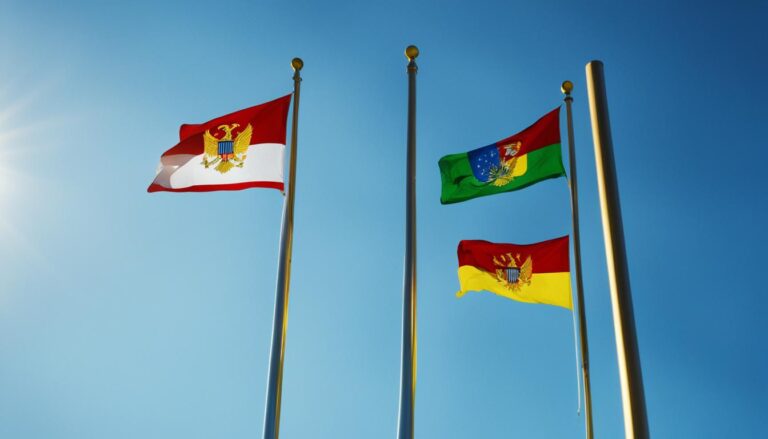How Old Am I in Ethiopia?
Did you know that calculating your age in Ethiopia is different from the rest of the world? The Ethiopian calendar, rooted in ancient traditions and customs, holds a unique way of determining age. To truly comprehend your age in Ethiopia, you’ll need to delve into the intricacies of the Ethiopian calendar and its fascinating age conversion system.
Key Takeaways:
- Calculating your age in Ethiopia requires understanding the Ethiopian calendar and its age conversion system.
- The Ethiopian calendar is based on a 12-month system and incorporates additional days in leap years.
- To accurately determine your age in Ethiopia, educate yourself on the Ethiopian month names and conversion factors.
- The Ethiopian New Year, known as Enkutatash, falls on September 11th in the Gregorian calendar.
- Utilizing an Ethiopian age calculator or conversion tool can simplify the process of determining your age in Ethiopia.
Ethiopian Calendar Basics
The Ethiopian calendar is an important cultural and religious calendar used in Ethiopia, as well as by the Orthodox Tewahido Church. It shares similarities with the Coptic calendar and follows a solar system. Understanding the basics of the Ethiopian calendar is essential for various aspects, including calculating your age in Ethiopia and converting dates between the Ethiopian and Gregorian calendars.
In the Ethiopian calendar, a leap year occurs every four years, similar to the Gregorian calendar. However, the Ethiopian leap year has an additional sixth day, known as the “Epagomenal” or “Pagume” day. This additional day is followed by the start of the Ethiopian New Year.
In general, the Ethiopian calendar consists of twelve months, each with thirty days. However, in leap years, an extra month, called “Pagume,” is added. This month has either five or six days, depending on whether it is a leap year or not.
To convert dates between the Ethiopian and Gregorian calendars, there are online calculators available that provide accurate results. These calculators take into account the differences in month lengths, leap years, and the start of the Ethiopian New Year.
“The Ethiopian calendar offers a unique perspective on time and culture. It is fascinating to explore its intricacies and understand how it functions in relation to the Gregorian calendar.”
Ethiopian Calendar Month Names
Each month in the Ethiopian calendar has its own distinct name, different from the names used in the Gregorian calendar. Here is a list of the twelve Ethiopian month names:
- Mäggabit
- Miyazia
- Ginbot
- Sänä
- Hamle
- Nähase
- Pagume
- Mäskäräm
- Tikimt
- Hidar
- Miqränit
- Tänsas
These unique month names add to the distinctiveness and rich cultural heritage of the Ethiopian calendar.
Conversion Between Ethiopian and Gregorian Dates
Converting dates between the Ethiopian and Gregorian calendars requires an understanding of the differences in month lengths, leap years, and the start of the Ethiopian New Year. Online calculators provide a convenient way to convert dates accurately. Here is an example of how the conversion works:
| Ethiopian Date | Gregorian Date |
|---|---|
| 1 Mäggabit 2014 | 9 March 2022 |
| 1 Tikimt 1994 | 9 October 2001 |
| 1 Hidar 2010 | 8 December 2017 |
By using conversion tools or online calculators, you can accurately convert dates between the Ethiopian and Gregorian calendars, making it easier to navigate and understand the Ethiopian calendar system.
Ethiopian Calendar Conversion

Understanding the Ethiopian calendar is essential for accurately determining your age in Ethiopia. Let’s explore the key conversion factors that will help you navigate this unique calendar system.
Ethiopian Calendar Summary
The Ethiopian calendar is a solar calendar with 365.25 days in a year. It consists of 12 months, each with 30 days, and an additional 5 or 6 days in leap years. This calendar is widely used in Ethiopia and holds great cultural significance.
Ethiopian Month Names
The Ethiopian month names differ from those in the Gregorian calendar. Here are the names of the months in the Ethiopian calendar:
- Mäggabit
- Miyazya
- Genbot
- Säné
- Hämle
- Nähase
- Mägabit
- Miyazya
- Genbot
- Säné
- Hämle
- Nähase
- Pagumän
Ethiopian Week Day Names
The Ethiopian calendar also follows a seven-day week, with each day having a unique name:
- Dilbata
- Wixata
- Qibxata
- Xamsata
- Camisata
- Jumqata
- Sanbata
Gregorian Start Date
The Ethiopian year usually begins on September 11th in the Gregorian calendar. However, in leap years, it begins on September 12th. This difference in start dates is due to the inclusion of a sixth epagomenal day in leap years.
To provide you with a visual representation of the Ethiopian calendar, here is an image:
Start Date in Year After Sixth Epagomenal Day
When calculating your age in Ethiopia, it is crucial to take into account the start date in the year following the sixth epagomenal day. By considering this factor along with the Ethiopian month names, you can accurately determine your age according to the Ethiopian calendar.
Now that we have a better understanding of the Ethiopian calendar and its conversion factors, let’s move on to exploring the significance of Ethiopian New Year.
Ethiopian New Year

The Ethiopian New Year, also known as Enkutatash in Amharic and Ri’se Awde Amet in Ge’ez, is a significant celebration in Ethiopia. This festive occasion marks the beginning of a new year in the Ethiopian calendar. Falling on September 11th in the Gregorian calendar (September 12th in leap years), the Ethiopian New Year is a time of joy, renewal, and reflection.
Enkutatash, which means “gift of jewels” in Amharic, commemorates the biblical story of the Queen of Sheba returning from her visit to King Solomon in Jerusalem, adorned with lavish gifts. According to tradition, the people of Ethiopia welcomed her back by laying fresh flowers and greenery along her path.
In Ethiopia, the New Year is a time for families and friends to gather together, exchange good wishes, and extend acts of kindness to one another. It is a time to express gratitude for the blessings of the past year and look forward to new beginnings.
The Ethiopian calendar follows a different set of correspondences compared to the Gregorian calendar. While the Gregorian calendar year is commonly known as 2022, the Ethiopian calendar year is 2015/2016, since the Ethiopian calendar consists of 13 months and is approximately seven to eight years behind the Gregorian calendar. The Ethiopian New Year typically marks the transition to the next Ethiopian calendar year.
The Ethiopian Calendar Year Names
In addition to Enkutatash, each Ethiopian calendar year has its own specific name and meaning. These names are derived from various sources, including religious texts, historical events, and cultural significance. The names often carry symbolic representations of hope, prosperity, and gratitude. For example, some of the Ethiopian calendar year names include:
- Enkutatash (Gift of Jewels)
- Meskerem (Mercy)
- Tikimt (Rest)
- Hidar (Rejoice)
- Tahsas (Confidence)
- Tir (Harvest)
- Yekatit (Destroy the Enemy)
These unique year names add to the cultural richness and diversity of Ethiopia, showcasing the deep-rooted traditions and values of its people.
The Ethiopian New Year provides an opportunity to experience the vibrant traditions and festivities of Ethiopia. It is a celebration that brings together communities, promotes unity, and fosters a sense of shared heritage. By honoring the Ethiopian New Year, we embrace the richness of Ethiopian culture and join in the spirit of new beginnings.
Conclusion
Calculating your age in Ethiopia may seem complex, but with a solid understanding of the Ethiopian calendar and the right tools, it becomes a straightforward process. By considering factors such as the start date of the Ethiopian year, the unique month names, and the additional days in leap years, you can accurately determine your age in Ethiopia.
To make the calculation even easier, we recommend utilizing an Ethiopian age calculator or conversion tool. These handy tools take the guesswork out of the equation and provide you with accurate results within seconds. Simply input your birth date, let the calculator do its magic, and discover your Ethiopian age with ease.
So, whether you’re planning a trip to Ethiopia or simply curious about your Ethiopian age, embrace the uniqueness of the Ethiopian calendar. Unlock the secrets of this ancient system and gain insight into your age in Ethiopia. Be it for personal reasons or cultural interest, the Ethiopian age calculator and conversion tool will help you uncover this fascinating aspect of your identity.





